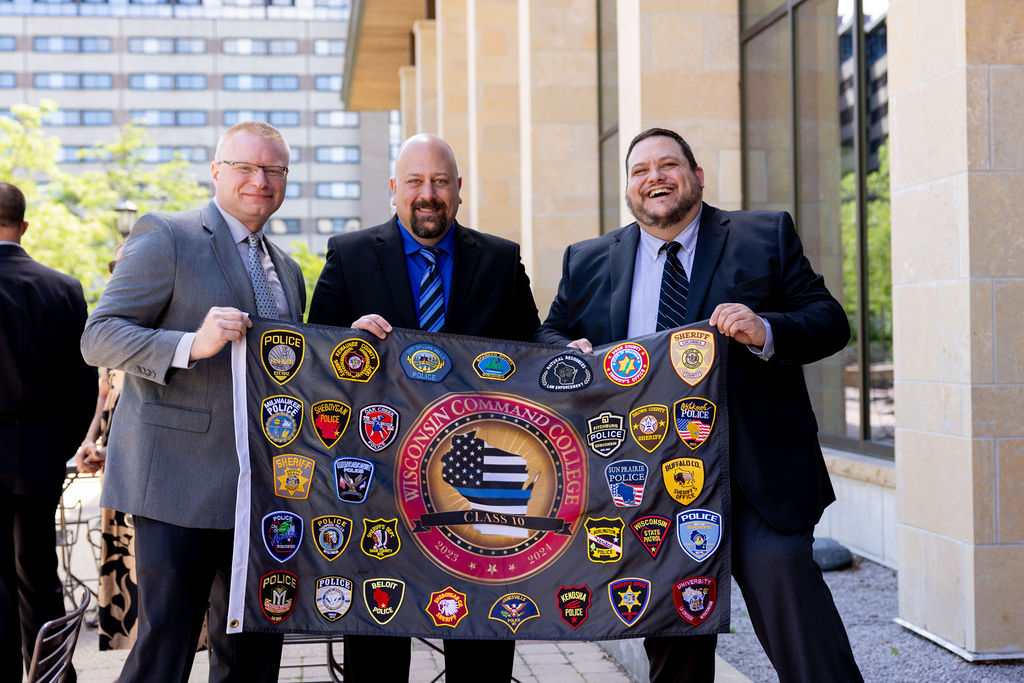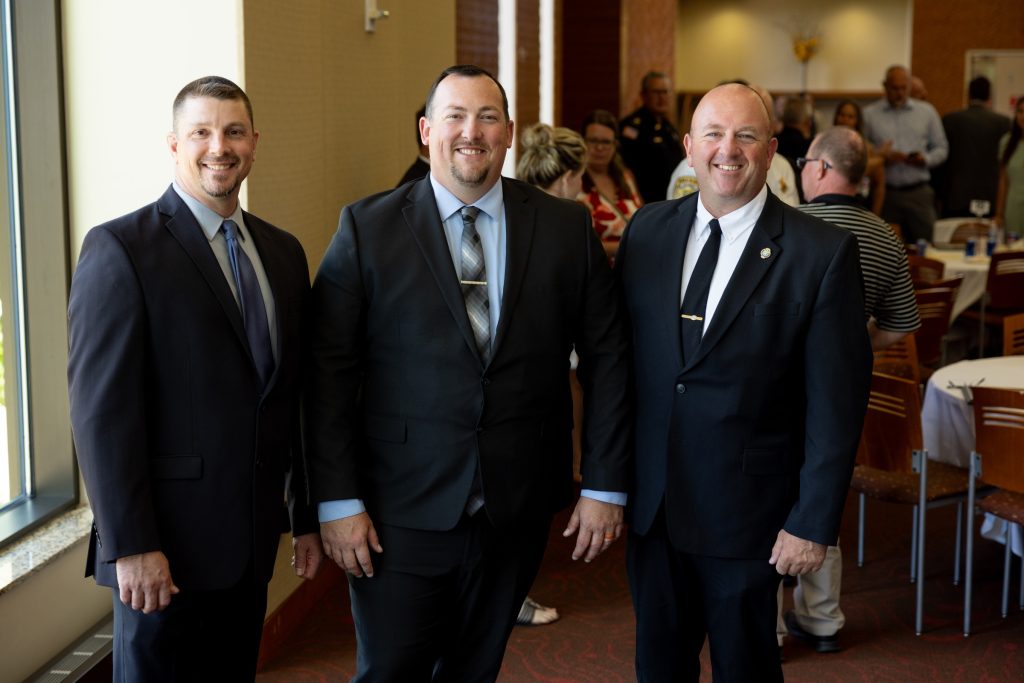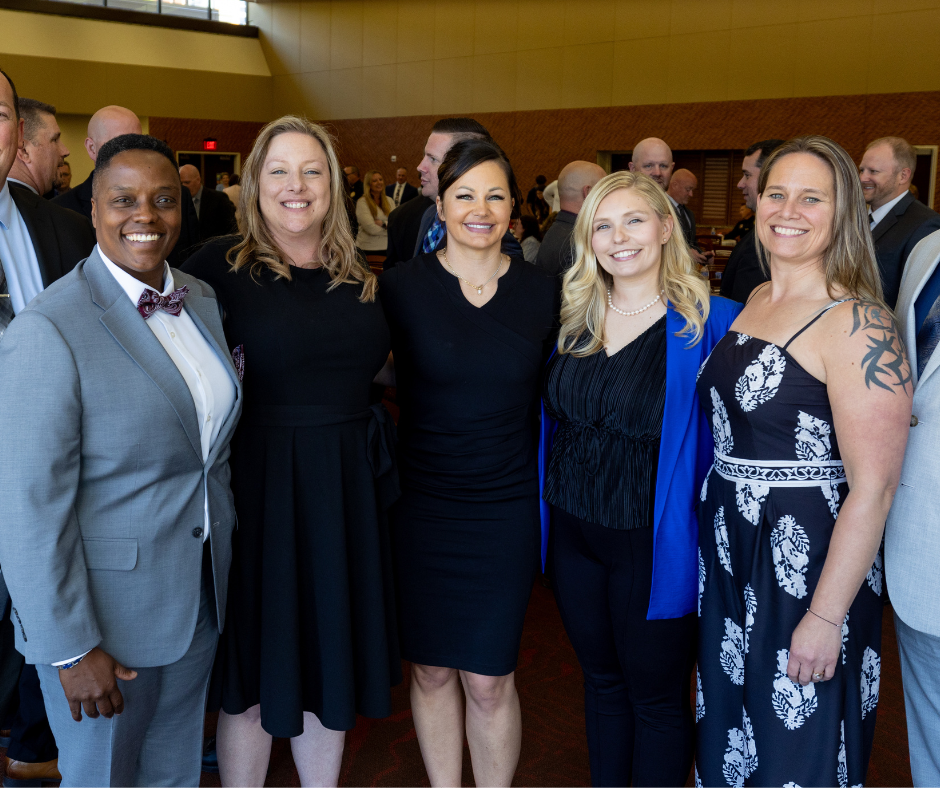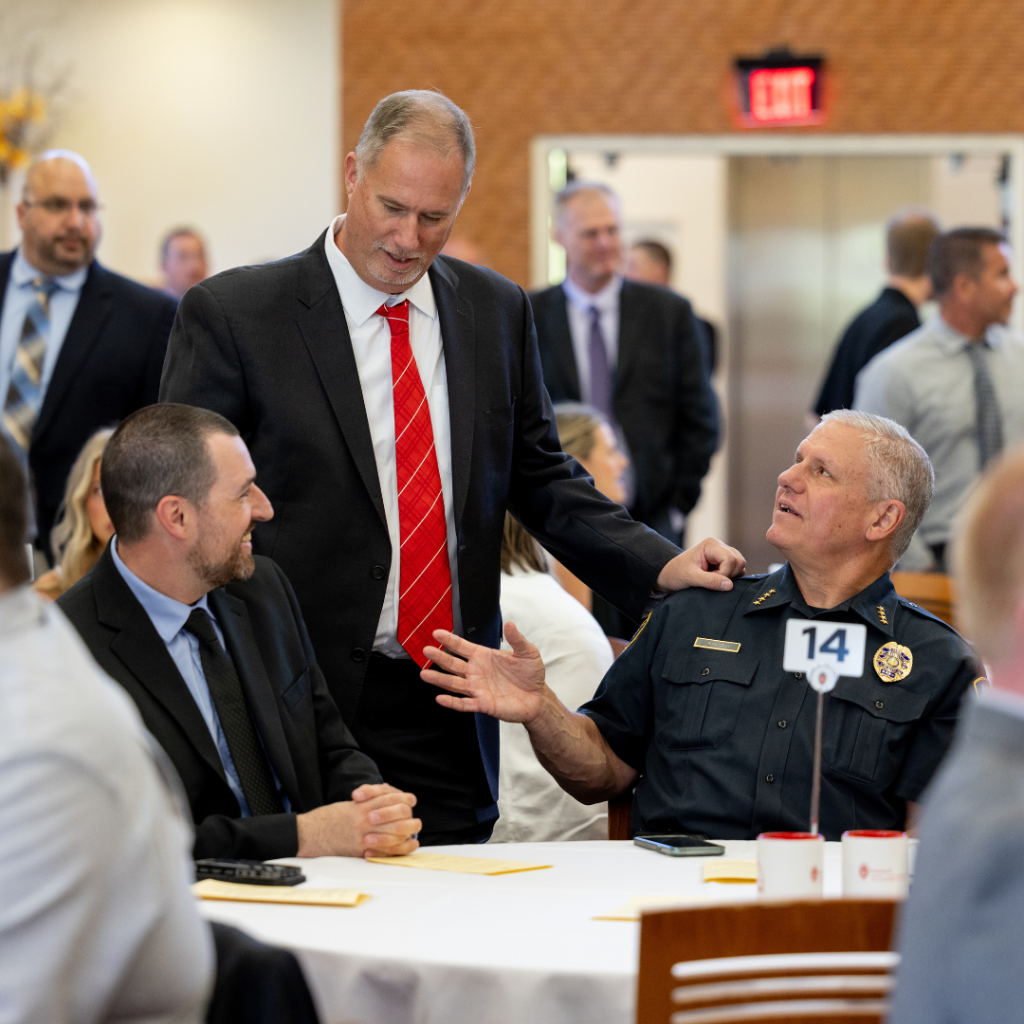After a 25-year career working for the Milwaukee Police Department, Jim MacGillis was planning to retire and try something new. Then the position of police chief opened in Wauwatosa, his hometown. “I’ve got family here, and I had seen the good human beings in this department have a front-row seat during the worst of times…and I really wanted to work here because they’re good cops,” said MacGillis.
He gives a lot of credit to the Wisconsin Law Enforcement Command College (The Command College) for giving him the tools and confidence to move into a chief executive position. As a 2018 graduate, he says the program prepared him to succeed as a leader and encouraged him to take a more strategic perspective on law enforcement. “What can I do while I’m here, focusing on how things were, where we’re at now, and then where do we need to take the organization? The byproduct has been way better community relations, way better strategic communication, and being able to have tough conversations,” he said.
MacGillis is not alone. According to Stacy Lenz, Training & Event Manager with the Wisconsin Department of Justice, Division of Law Enforcement Services, 75% of The Command College graduates go on to become chiefs or sheriffs and move up in the ranks within their agencies.

Training leaders for Wisconsin
In 2011, a group of stakeholders met to discuss needs and identify gaps in training for law enforcement throughout the state. “We really identified at that time that leadership development was the biggest hole that we had,” said Lenz. The Command College is a joint venture of the Department of Justice and Extension’s Certified Public Manager® Program (CPM), with a mission to prepare law enforcement leaders for the challenges facing their profession.
A new group begins every September and spends one week every other month together learning new skills and theories that prepare them for their role in executive leadership. Over a 9-month period, participants become Certified Public Managers® and have the opportunity to discuss public management within the context of law enforcement.
While there are other leadership programs available to law enforcement, Lenz said it was important to design something that was specific to Wisconsin, “We wanted something that was born and bred from Wisconsin to get back to the leadership that we want to develop.” And, the response has been very positive. Lenz said, “They like this more because it is from Wisconsin leadership. They’re getting their own ground instruction.”
Making leadership training applicable and accessible
Shawn Splivalo, chief of police in Kohler, WI, is a 2024 Command College graduate. He decided to attend because others in his department were looking for leadership training and he wanted to make sure that The Command College was worth their time. “The advantage of the Wisconsin Command College is that it’s geared specifically for the state of Wisconsin. So you don’t get a broad general overview of what command is. You don’t get a theoretical concept, you get specific to Wisconsin,” said Splivalo. Using the example of the Family Medical Leave Act (FMLA), he explained, “You talk about how that applies in the state of Wisconsin and how the state of Wisconsin has applied that issue, so it’s definitely more specific and I feel like it puts your command staff in a better position. They’re not left to wonder how that works in their home state. It’s clear.” And that means they can take the information home and start using what they’ve learned.

Splivalo appreciated the structure of the program as well. “The biggest thing is that it’s broken up, of those one-week intervals over a year,” said Splivalo, “I would say for any small agency, be it a lieutenant’s position, captain or chief, having any of your executive level staff disappear for 8 to 12 weeks is probably impossible.” Because there are a lot of smaller departments in Wisconsin, designing a Wisconsin program has allowed The Command College to create a schedule that allows more people to attend and is more inclusive for police departments of all sizes.
Learning from experience
Part of The Command College’s success is because of the experts and professionals that teach each session. Brad Wentlandt, Extension educator and Command College program director, has been with the program since its inception. He pulled from his 34 years of law enforcement experience and the CPM® program’s seven core leadership competencies to design and develop the curriculum, which includes many of the practical aspects of being a chief or sheriff, such as human resource management, budgeting, records management, and conducting internal investigations. Those topics are combined with learning about ethical leadership, communication and writing skills, problem-solving, strategic planning, quality improvement, and more.
Wentlandt was also committed to bringing in professionals with lived experience so participants could learn from and ask questions of those who served. “We use Wisconsin specific instructors, trying to use sitting chiefs or senior executives as instructors wherever possible to really get people that are in the field, who are experiencing things right now,” said Wentlandt. Providing that level of expertise and experience has led to important discussions and sharing among participants.
Over her 13 years with the Appleton Police Department, Lieutenant Meghan Cash, has worked in special investigations, patrol, and public information. Now, she is Appleton’s Community Resource Unit Lieutenant, supervising officers as well as non-sworn staff. In that position, she handles anything that is outward-facing for the Police Department. “I have a very different team than most people do at the Police Department,” said Cash, “It’s all of the aspects of our job that people typically don’t think law enforcement are involved in- preventing issues and filling in the gaps post-incident. So when looking for a program to enhance my skills in managing a team like that I thought Command College would be a great option for me”
She graduated in 2024 and is glad she made the decision to attend. “Law enforcement as a whole, whether individual departments or statewide, has a lot of opportunities throughout the year and all throughout a career to attend training. [The Command College] is like a next-level immersive experience that allows you to learn from the mistakes that others are making and be able to hear from them on a real one-on-one basis rather than somebody instructing to a large room where you are hearing broad examples.”
Having instructors and peers with lived experience makes a big difference to Cash, both for herself and her community. “Every single week there’s something you’re learning, whether that’s formally or informally from somebody. My community is going to be better for that. I’m going to have the tools, the understanding, the network to be able to address those things upfront rather than have to figure it out on my own,” said Cash.
Expanding skills and capabilities
With a diverse curriculum that encourages discussion and reflection, participants are able to learn new skills and further develop capabilities important to their current position and future opportunities. Splivalo found budget discussions helpful. While he had overseen his department’s budget, having a better understanding of how the police department fit into the larger municipal budget helped him better plan for future expenses. “Without understanding the revenue sources that the village has or is going to have, it’s hard to ask for things or strategically plan for us in a 5- or 10-year plan,” said Splivalo, “As a police executive, to see where we’re headed in 2025 and 2026- where these funds should become available due to an expansion of neighborhood or development of a TIF district, I can ask for those bigger ticket items then,” said Splivalo.
Cash said that The Command College gave her an opportunity to better understand her leadership style and use that to effectively lead her team. “For me coming to The Command College and having somebody say, ‘This is a specific type of leadership that you have, this is a certain thing that you’re doing that’s allowing you to connect on a deeper level with your team,’ allowed me to hone those skills more,” said Cash. “A lot of the topics we talked about in The Command College were fostering those relationships and how you can do a better job of connecting with people,” said Cash.
MacGillis benefited from learning more about taking a strategic approach to everything he does. As chief, he has emphasized workplace culture and is finding new ways to build trust between the police department and the community, all things he learned at The Command College. “This department had been so task-oriented and focusing on the now, focusing on the next week, not focusing enough on the year to three-year to five-year outlook. Where do we want to go with this? How do we get to those goals and achieve them?” said MacGillis, “It’s really focusing on what we’re here to do again, where we were, where we are now, and where we want to take it,” said MacGillis.
Bringing a renewed perspective

One goal of The Command College is gaining new perspectives on leadership. “When you leave this program, for the most part, people go back to their organizations and their communities with a renewed perspective that makes them a better leader, makes their organization better, and helps them to better serve their communities,” said Wentlandt. That renewed perspective is apparent in the individual capstone projects that each participant completes as part of the course. Through their capstone project, students put what they learned into practice.
Lieutenant Amber Rozek with the Winnebago Sheriff’s Office has worked in the county jail for 22 years. Her sheriff requires all top-level administrators to attend advanced leadership management training. With a captain position opening up in the next 2 years, she was encouraged to attend. While she is the first person in her department to attend The Command College, she said the 6-week class stretched out over one year was more feasible for her. She graduated in 2024 and her department has already enrolled someone in the 2025 class because of her feedback.
As part of her capstone project, she created a curriculum to train and organize a statewide Major Investigation Response Team. “One of the issues that we have seen is there has been a huge rise in in-custody deaths around the state, mostly attributed to drug overdosing and the poor health of the people coming into our care,” said Rozek.
Her project aims to provide transparency in investigations, both for departments and the community. By having a standardized investigation process, departments will know what to expect. For the community, the process will be publicly available so there is no question about the security or reliability of the investigation. “It’ll also speed processes along,” said Rozek, “and we can move through these situations a little bit quicker for closure for the family and also to report out to the community- you had a death in your community. This is what happened and this is what changes are going to come out of this.” Her next step is to present to the Badger Sheriff’s Association and discuss who wants to participate. Then she will start training people and get a team ready to go.
The idea for the response team and curriculum came about from her participation in The Command College. Seeing an issue and taking a new perspective on how to solve it is an ongoing conversation throughout the 9-month course. “It’s making us really reflect because every day after we had a class, we wrote an essay. So it’s really making you think about what you learned and how you can apply that,” said Rozek, “This class just fosters that because you spend six weeks with like-minded people that all have the same agenda to be better- not be better than each other, but to be better in general as a law enforcement profession,” said Rozek.
Emphasizing community trust and empathy
Part of that renewed perspective is talking about working with community members and partners. “We talk a lot about empathy and putting yourself in the other person’s shoes and understanding where they’re coming from, which is really, really important when you’re dealing with members of your community,” said Wentlandt. He often reminds participants to consider who they work for, “At the end of the day, who do you work for? You work for the citizens. Understanding who they are and where they’re coming from goes a long way toward building relationships. You’re not just a service provider in that community. You’re a member of that community.”
MacGillis has prioritized building community trust in his agency. “The only piece that we were missing generally is the empathy piece. Just the facts, ma’am, just the facts. We, as a profession, have been very ‘Joe Friday-ish’. Well, no, we’re people. Those are people’s lives we just impacted,” said MacGillis. He has made an effort to communicate with more empathy and to humanize communications with the community.
For Cash, community trust is a big part of her job. As she interacts with the community, she recognizes the importance of strong relationships. “A lot of the topics we talked about in The Command College were fostering those relationships and how you can do a better job connecting with people. I think that was really helpful,” said Cash.
Building a network of peers

Wentlandt and Lenz have another goal for the program- they have been deliberate about building a program that emphasizes professional networking and peer support. For Wentlandt, those tight bonds build a long-term support system for the participants, which is an important aspect of wellness. “One of the biggest things that we focus on right now is peer support and mental health and wellness and how supportive students have been to others in the class when things have happened in their communities.” Having strong allies and fostering a culture of care is one way that The Command College continues to impact its graduates and the communities where they lead.
For those who pursue promotions, the peer support fostered during the program is important for building confidence and providing support. “To know afterward that if you run into something that you have people that you can call for advice. I have papers sitting on my desk right here from one of my classmates. He’s putting in for a captain’s position, and he asked us to read over what he’s submitting. So it’s the things like that where you don’t feel like you’re asking stupid questions when stuff comes up because we have such a good relationship,” said Rozek.
Those peer relationships are also important for making decisions and figuring out how to handle things that come up in the line of duty, especially at the executive leadership level. “The ability to talk and compare and use as a resource the other executives in that room not only in the six weeks but beyond that, I think is second to none,” said Splivalo, “Ultimately, it’s that ability to have a classmate that you can call up and say this is what I’m dealing with. How did you guys deal with this? I heard you had that going on.”
Even six years after graduation, MacGillis is still in regular contact with many of his classmates. He reaches out to them for advice and support, which has been invaluable in his role as chief. “A lot of them are chiefs now or higher levels of management such as a village manager somewhere. If I need some advice, I can ‘phone a friend.’ How would you navigate this? What do you think about this? Or even, hey, I’m having a rough day, I need to bend your ear here and vent a little bit. So that’s important,” said MacGillis.
Leading ethically, professionally, and with purpose
Commitment to The Command College and leadership development in Wisconsin continues to be strong. “This program is the Wisconsin Department of Justice’s flagship leadership program for law enforcement,” said Lenz, “The feedback that we get from the students is one of the most positive successes we’ve had.” Each year the program receives 90 applications for 35 spots, so they know their reputation is good and officers want to attend. Extension is helping to reach that goal by providing the academic rigor and certification of the CPM program.
Wentlandt is proud of the impact that the program is having on communities throughout Wisconsin. “DOJ’s interest here is in having the best trained, best-educated law enforcement executives in the state so that we can lead ethically and with purpose,” said Wentlandt, “When you go through a course like this, as much from the instruction as from what you learn from the other students, it pays dividends in how these individuals serve their communities.”
For Splivalo, The Command College has larger implications for policing and executive leadership. “I think it’s important, especially in today’s day and age, as a community, that we have professionalism in our ranks and that we have a foundation, a basis for how we’re conducting ourselves,” said Splivalo. He sees The Command College as a way to formally educate police leaders to meet the expectations of the community and he plans to send others in his department. “If we don’t create an avenue for somebody to get that education, they may not. And then they’re either doing what their predecessors did or they’re making it up.”
Cash sees The Command College as training tomorrow’s leaders who will be instrumental in shaping Wisconsin’s future. “We’ve seen some of the worst years that law enforcement has experienced in quite some time and this group is growing through that. And, changing the way law enforcement is looked at, making it better not only for our communities but for the agencies themselves by taking what we’ve learned and then integrating that in a way to push law enforcement to the future.”
——————————-
Learn more about applying to be part of the 2025-2026 The Command College cohort.